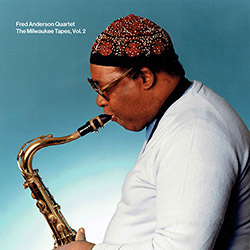
This 1980 session (no date is given, just "January or February") comes from a period of relative silence for saxophonist Fred Anderson, a seminal member of Chicago's creative music scene, so it is interesting to hear what audiences were getting at the time, and which we are fortunate enough to have a chance to hear today, over 40 years later.
What is remarkable about this session is Anderson's mature sound in his prime, as well as his sympathetic interactions with his frequent collaborator from early on, trumpeter Billy Brimfield. We also get a young Hamid Drake on drums, a drummer who needs no introduction to Squid's Ear readers, and whom Anderson brought into his band early in the drummer's career. Bassist Larry Hayrod, a lesser known but no less talented artist, completes the quartet.
Both Anderson and Brimfield have the distinction of having been shaped by some of the modern jazz greats of their youth, monster players like Charlie Parker and Lester Young, so their sound is steeped in that tradition, but their ideas, playing style and compositions have qualities all their own, with a vocabulary developed away from the kind of venue and circuit that formed most jazz players of their generation. Instead of the standard repertoire played in working bands steeped in the American songbook variety, Anderson and Brimfield kept an ear on the sounds of their day and favored the experimental and Afro-centric creative energy approach to music, and developed in that direction.
These characteristics of their musicality, i.e. the combination of that vintage sound with a forward thinking aesthetic element (not to mention their consummate technical abilities) is ringingly clear in this release and it kept this listener riveted from start to finish, basking in the wondrous sounds of these players swirling by in an effortless, suave yet forceful way. The fact that Anderson penned four of the album's five pieces, with one by Brimfield, has a lot to do with the originality of the band sound. Add to that the fresh, inspired playing of a young Hamid Drake and Larry Hayrod and you get something other than your usual post-bop quartet nailing renditions of old nuggets. These were composing musicians forging their own language with elements of the vocabulary of those who came before, a time-honored aspect of the jazz tradition, and one that they pulled off brilliantly.
Comments and Feedback:
|



